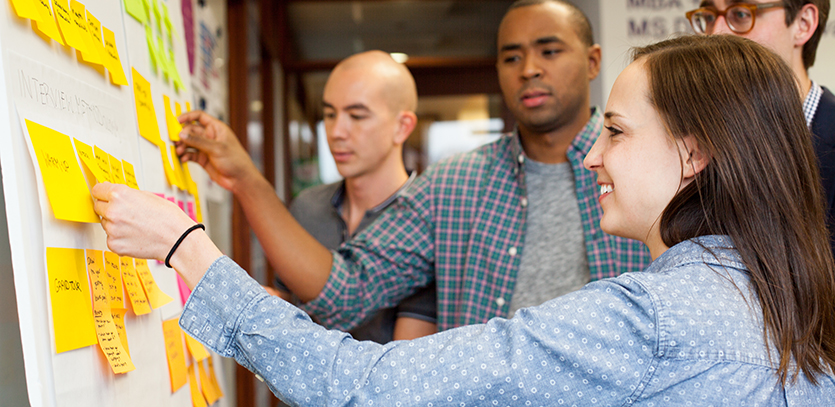Designing Solutions for Real-World Problems
MMM students collaborate with Hormel, NorthShore, and McDonald’s
This past winter, students in the MMM Program at Northwestern collaborated with NorthShore University HealthSystem, McDonald's, and Hormel Foods Corporation as part of the program's capstone educational experience: Business Innovation Lab.
The MMM Program is an immersive dual-degree graduate program that combines business education with design innovation. MMM graduates receive an MS in Design Innovation from Northwestern Engineering and an MBA from Northwestern's Kellogg School of Management.
In Business Innovation Lab, MMM students work in small teams under the mentorship of a faculty adviser. The students apply the knowledge they have gained from their previous MMM coursework — including the human-centered design process, ethnographic research techniques, and insight development — to real-world problems presented by leading organizations.
Sydney Rossman-Reich (MMM '18) reflected on the most meaningful aspect of Business Innovation Lab for her.
"It was exhilarating leveraging design thinking to encourage our clients to view their customers, products, and services through a lens they may never have used before," said Rossman-Reich.
Hormel
Hormel Foods issued a challenge to a team of MMM students: How might we deliver a simplified chili experience to those who seek a homemade chili recipe in convenient ways to fit their lifestyle? After eight weeks of ethnographic research, insight development, and rapid prototyping, the team pitched several new products, services, and customer experiences through which Hormel might satisfy the unmet needs of that market.
Rossman-Reich and her teammates worked closely with faculty mentor Martha Cotton, Senior Design Director of Design Research at Fjord/Accenture Interactive, throughout the project.
"The student team did an excellent job breaking down the complexity of chili-making in order to gain inspiration for innovation—looking at how it plays out in everything from family dynamics to social networking," said Cotton. "I was impressed with their passion for the topic and for helping take Hormel into new and exciting territories for their chili business."
The team applied core tenants of ethnographic research to create a framework for understanding Hormel's target customers.
"We engaged in follow-me-homes, interviews, video journaling, and surveys to reach over a hundred potential customers in Hormel's target market," said Rossman-Reich.
Mark Beierle, a Brand Manager for HORMEL® Chili, was impressed by the team's final deliverables.
"When I consider what the MMM students were able to accomplish in such a short time, our team was amazed
NorthShore University HealthSystem
NorthShore University HealthSystem asked a team of MMM students to improve the patient journey. Elizabeth
"For me, Business Innovation Lab was the perfect opportunity to apply design thinking to an industry I love and test out a career goal," explained
Carol Franczek, Senior Vice President of Marketing & Corporate Communications at NorthShore, applauded the efforts of the MMM students.
"The final presentation provided terrific insight," said Franczek. "I particularly liked their prototyping phase which revealed to them which options would work and which wouldn't. This step ultimately led to the students recommending ideas that could be effectively implemented."
McDonald's
The focus in Business Innovation Lab is often the customer, but McDonald's asked a team of MMM students to design a better work experience for its franchisees' crew members. The team worked closely with an Illinois-based McDonald's restaurant owner and crew members across eleven locations.
Matthew Savard, Manager of Experience Design at McDonald's, praised the MMM students for their work.
"The students did a particularly good job managing the relationship with the busy restaurant owner they were assigned to work with," said Savard. "They not only formed a great working relationship with the owner but won him over to the design way of thinking."
The team, including Natasha Singh (MMM '18), embraced the power of iteration throughout the project.
"We weren't afraid to revisit our research plan, build and break down our ideas, and revise as a team," said Singh.
Singh and her teammates met regularly with faculty mentor Amy Schwartz, Human Centric Design Thought Leader at Battelle, throughout the project.
"I was impressed by how they empathically embraced the problem of the crew experience by putting themselves in the shoes of crew members but also placed the problem in a larger stakeholder ecosystem," said Schwartz. "They did immersive design research not just with crew members, but also with owner/operators and their design concepts were inspired by and built around insights that addressed needs of both of these stakeholders."
During their final presentation for Savard and other McDonald's representatives, the team proposed three solutions.
"Each solution represented a small step, a moderate jump, or a large leap in the McDonald's employee experience," said Singh. "We communicated these solutions through the lens of desirability, feasibility, and viability, showcasing the value of design thinking."
Savard expressed admiration for the energy that the MMM students brought to the challenge.
"The students developed deep insights with unusual efficiency very efficiently, using far less time and far fewer interviews than the company would on its own," said Savard. "Their insights and concepts impressed people from a variety of disciplines and points of view, [including] design/innovation, operations, HR, and franchisee, and they are grounded in business reality."
Aside from Hormel Foods Corporation, NorthShore, and McDonald's, MMM students collaborated with other organizations on Business Innovation Lab projects during the past academic year, including Google, Brunswick, Whole Foods, Visa, Victory Gardens Theater, Honeywell Aerospace, ZX Ventures backed by Anheuser-Busch InBev, and Barilla.

